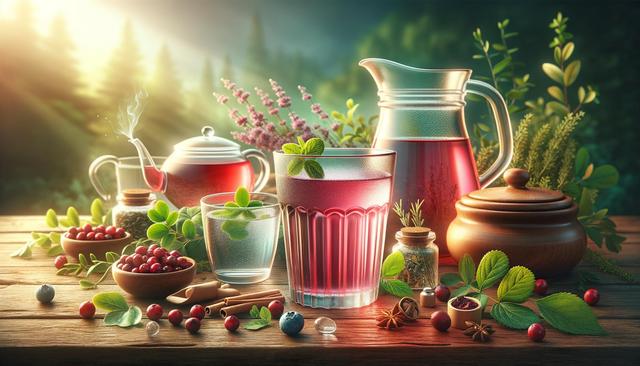
Bladder-Friendly Drinks to Help Manage Urinary Incontinence
Understanding Urinary Incontinence and Its Triggers
Urinary incontinence affects many individuals and can range from occasional leaks to more persistent issues. One of the key factors in managing this condition involves understanding what can trigger or aggravate it. Diet and fluid intake play crucial roles. Certain beverages may irritate the bladder lining or increase urine production, both of which can worsen symptoms. Recognizing which drinks to avoid and which to incorporate can make a noticeable difference in managing incontinence.
Common beverages that may worsen urinary incontinence include:
- Caffeinated drinks like coffee, soda, and energy drinks
- Alcoholic beverages
- Carbonated drinks, even if caffeine-free
- Citrus juices such as orange or grapefruit juice
These drinks can act as diuretics or bladder irritants, leading to increased frequency and urgency. On the other hand, there are several drink options that are gentler on the bladder and may even offer supportive benefits for urinary health.
Hydration Without Irritation: Water and Its Variations
Water remains the most bladder-friendly drink and should be the foundation of your daily fluid intake. Staying well-hydrated helps dilute urine, which reduces its acidity and makes it less likely to irritate the bladder lining. However, moderation is key. Drinking too much water at once can increase urgency, while too little can lead to concentrated urine and bladder irritation.
Some variations of water that may suit individuals with urinary incontinence include:
- Infused water: Add sliced cucumbers, mint, or berries for subtle flavor without bladder irritation
- Alkaline water: Some people find it gentler on the bladder due to its lower acidity
- Filtered water: Removing chlorine and other chemicals can be beneficial for sensitive individuals
It’s also helpful to monitor the timing of your water intake. Drinking smaller amounts throughout the day and reducing intake a few hours before bedtime can help control nighttime urination.
Herbal Teas That May Support Bladder Health
Herbal teas can be a soothing and supportive option for those dealing with urinary incontinence. Not all herbal teas are created equal, though. Some, like green or black tea, contain caffeine and are best avoided. Instead, look for non-caffeinated options that are known for their potential bladder benefits.
Examples of herbal teas that may support urinary tract and bladder health include:
- Chamomile tea: Known for its calming properties, it may help relax bladder muscles
- Corn silk tea: Traditionally used to support urinary tract wellness
- Marshmallow root tea: May coat and soothe the bladder lining
- Horsetail tea: Often used for its mild diuretic and astringent properties
Before incorporating new herbal remedies, it’s wise to consult with a healthcare provider, especially if you’re taking medications or managing other health conditions.
Cranberry Juice: A Renowned Drink for Urinary Health
Cranberry juice has long been associated with urinary tract health, particularly in preventing infections. While it doesn’t treat urinary incontinence directly, reducing the risk of infections may help minimize bladder irritation and associated symptoms. Choose unsweetened cranberry juice or low-sugar versions, as high sugar content can sometimes contribute to bladder discomfort.
Potential benefits of cranberry juice include:
- Helping prevent bacteria from adhering to the bladder wall
- Supporting overall urinary tract health
- Providing antioxidants that may reduce inflammation
It’s important to note that cranberry juice may not suit everyone. It can be acidic and may irritate sensitive bladders in some individuals. A small amount diluted with water is often a safer way to introduce it into your routine.
Drinks to Avoid and Tips for Smarter Choices
When managing urinary incontinence, knowing which beverages to limit or avoid is just as important as choosing helpful ones. Caffeine and alcohol are two of the most common culprits. They stimulate the bladder and increase urine production, which can lead to accidents or discomfort.
Other drinks to be cautious with include:
- Artificially sweetened beverages, which may contain irritants
- Citrus-based juices that can be acidic
- Full-strength sports drinks, particularly if high in sugar or artificial ingredients
Here are a few practical tips for making smarter drink choices:
- Read labels to avoid caffeine and high sugar content
- Try diluting juices with water to reduce acidity and sugar intake
- Keep a bladder diary to track which drinks affect your symptoms
- Speak with a healthcare provider about your fluid choices, especially if symptoms persist
Tailoring your beverage intake to your body’s responses can lead to more effective symptom management and a better quality of life.
Conclusion: Choosing the Right Drinks Can Make a Difference
Managing urinary incontinence involves a combination of lifestyle strategies, and choosing bladder-friendly drinks is a simple yet effective step. By focusing on hydration through water, soothing herbal teas, and possibly cranberry juice, while avoiding irritants like caffeine and alcohol, individuals can better support their bladder health. Everyone’s body responds differently, so paying attention to how specific drinks affect your symptoms is essential. Making thoughtful beverage choices can complement other management strategies and help you stay more comfortable and confident in your daily life.


